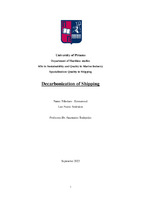| dc.description.abstractEN | Shipping is considered to be the most important pillar of the global economy because
it is not only the only way to transport raw materials, food, and products to every corner
of the globe, but it also benefits everyone’s economic development. The shipping
industry's environmental impacts include greenhouse gas (GHG) emissions, noise
pollution, and oil pollution. Approximately 90% of global trade is carried out by ship.
According to an IMO report (2009), international shipping is responsible for 2.7% of
global carbon dioxide (CO2) emissions. The figure below details the CO2 emission
rates per sector as processed and calculated in the 2009 IMO report.
According to what was previously stated about shipping decarbonization, it should be
also stated that shipping transport is by far the most energy efficient mode of transport
in terms of energy/tonne kilometer. Ships currently consume only 3% of the world's
final energy demand, including 7% of the world's oil, primarily for international cargo
shipping, also known as ocean liners. The IMO sulfur cap regulation went into effect
in 2020, requiring the use of fuel with reduced sulfur to 0.5% or the use of a fuel catalyst
for ships that use the old type of oil as fuel. As a result, the type of fuel used by the fleet
has changed dramatically. - However, a significant amount of heavy fuel oil is still used
on ships equipped with scrubbers.
Furthermore, substantial additional investment is required to provide the necessary
recharging and refueling infrastructure, particularly for zero-emission vessels and port
infrastructure. These resources are not currently planned for by Member States, as
reported in national implementation reports, and additional funding may be required to
meet the climate target. According to available data, the majority of Member States
have made limited investments in alternative fuel infrastructure for ship refueling with
Liquefied Natural Gas and energy supply from shore to ports. However, as the target
dates for implementation in 2025 or 2030 approach, the directive is likely to have a
significant impact, particularly in these areas. | el |


